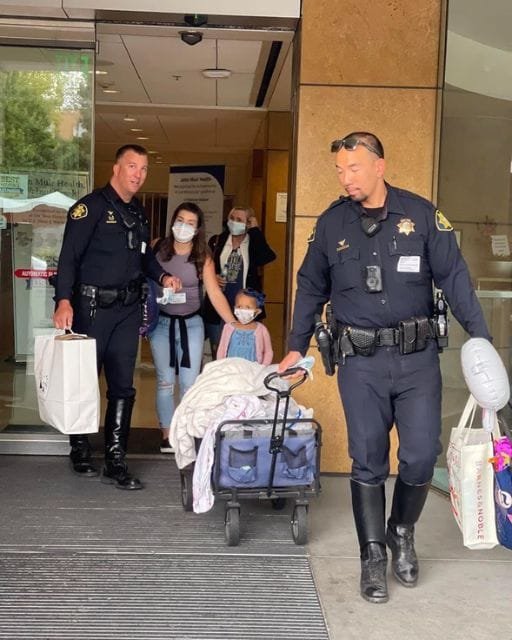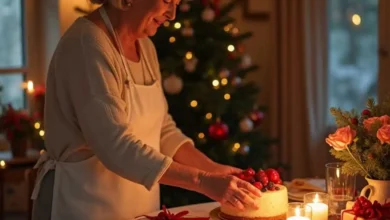THEY ESCORTED US OUT OF THE HOSPITAL — BUT NOT FOR THE REASON YOU THINK.

I should have felt relieved when they said we could finally leave.
Instead, I felt numb. I couldn’t shake the pit in my stomach, even though my daughter was grinning beneath her mask, clutching her stuffed animal, and waving to every nurse she saw.
We had nothing to go home to.
While I stayed with her at the hospital, day and night, waiting for tests and treatments, the rent had gone unpaid for months. Her father had passed away. My employer had said they “understood”… but they stopped calling two weeks ago. I knew what that meant.

I tried to hide it. I kept smiling for her, brushing her hair back, letting her pick out a balloon from the gift shop—even though we couldn’t afford it.
Then, two police officers showed up in the hospital lobby.
I felt a flash of fear. Maybe it was about the bills. Or paperwork I hadn’t completed.
But one of the nurses gave me a gentle nod and whispered,
“It’s okay. They’re here to help.”
The officers offered to carry our bags and take us to a “temporary placement.” I had no idea what that meant, and I was too tired to ask.
We walked out like any other family—wheels squeaking across the hospital floor, nurses waving goodbye.
But once we stepped outside, one of the officers leaned in and handed me a plain white envelope.
“Don’t open it until you’re in the van,” he said.
Now I’m in the van.
The envelope sits in my lap.
And I just noticed there’s a name written in the corner—his name.
Callie, my daughter, tugged at my sleeve and said,
“Mommy, is there ice cream?”
Her voice nearly broke me. It was so pure, so hopeful.
How do you explain to a six-year-old that there’s no more money? That everything is falling apart?
I forced a smile.
“Maybe later, sweetheart. Right now, let’s focus on our next step, okay?”
She nodded, content for the moment, and turned back to the window. The van rumbled along, the city fading behind us. Every so often, she’d point something out—a dog walking, a colorful mural on a building—and her joy would make me forget the fear that sat heavy in my chest.
But the envelope… I couldn’t stop thinking about it.
Why had the officer insisted I wait?
Whose name was that, scrawled in fading ink?
It felt familiar, but my mind was too exhausted to place it.
After what felt like forever, the van pulled into a quiet neighborhood. The houses were modest but tidy, with flower beds and trimmed lawns. We stopped in front of a small blue house with white shutters. A woman stood on the porch, arms crossed, watching us arrive.
“This placement is temporary,” one of the officers said. “Mrs. Harper will take care of you until further arrangements can be made.”
Temporary placement? Was this a shelter? Foster care?
I didn’t understand, but the officers had already exited the van before I could ask.
“Wait!” I called. “What about—”
The younger officer gently interrupted,
“Open the envelope.”
He gave me a knowing look before closing the door.
As Mrs. Harper approached the van, Callie bounced beside me. She looked to be in her fifties, hair pulled back in a silver bun. She smiled warmly, her eyes softening at the sight of Callie.
She greeted us kindly and helped us with our bags.
“Let’s get you settled,” she said.
Inside, the house felt warm and lived-in. Callie curled up beside me on the couch while I sat at the edge, envelope in hand. Mrs. Harper had stepped into the kitchen. I looked at the name again—Derek Monroe.
I gasped. Derek… Could it be?
With my heart pounding, I opened the envelope. Inside was a single page and a small note card with a key attached. The message read:
“This isn’t charity. It’s family.
427 Maple Street is the address.
There, everything will make sense.”
It was the very house we were sitting in.
My head spun.
Who had sent this?
And why?
I unfolded the letter and began reading. When I realized who had sent it—and why—I broke down in tears.
Derek Monroe was my older brother. We hadn’t spoken in years, not since he moved away after college. Life had pulled us in different directions. I didn’t even know if he still lived nearby.
But the letter said he had been following my situation. He pieced it together from social media, mutual contacts, whatever means he had. When he learned about Callie’s condition and our financial collapse, he stepped in.
“I may not have been there for you lately,” he wrote, “but I’m here now. This house is mine. It’s fully paid, furnished, and it’s yours for as long as you need it. No strings attached. Just promise me you’ll let me back into your life.”
Overwhelmed, I clutched the letter to my chest.
I’d thought he had forgotten about me.
But here he was—offering a lifeline when I needed it most.
Mrs. Harper returned with lemonade and a plate of cookies. She set them down and looked at me.
“You look like you’ve seen a ghost,” she said with a smile.
“It’s… complicated,” I said, handing her the letter.
Her eyes softened as she read.
“He’s a good man,” she said. “Quiet, private… but always ready to help. He asked me to check on you and make sure you felt at home.”
To say I felt safe would be an understatement.
I felt grounded. Hopeful. Loved.
Over the following days, Derek kept in touch. At first, it was just texts and short calls. Then one night, he showed up with food and board games. Callie took to him instantly—talking nonstop about cartoons and showing him her drawings.
Watching them together brought joy—and sadness.
I had carried this weight alone for so long.
But I didn’t have to anymore.
With time, things slowly stabilized.
Derek helped me find a part-time job at a local bookstore.
Callie returned to school, made new friends, and began to thrive.
And as a family, we found our way back to each other.
One afternoon, as we watched the sunset from the porch, Derek turned to me and said,
“You know, none of this changes what we are. You’re still my sister. Always have been. Always will be.”
Tears welled in my eyes.
“Thank you,” I whispered. “For everything.”
Life still isn’t perfect.
Healing takes time, and we still face challenges.
But for the first time in what feels like forever, I have hope.
If I’ve learned anything, it’s this:
Don’t give up, even when everything feels impossible.
Reach out. Accept the hand that’s offered.
And to anyone reading this: family isn’t just blood.
It’s who shows up when it matters.
If this story touched you, like it. Share it.
Let someone know: you’re not alone. ❤️





